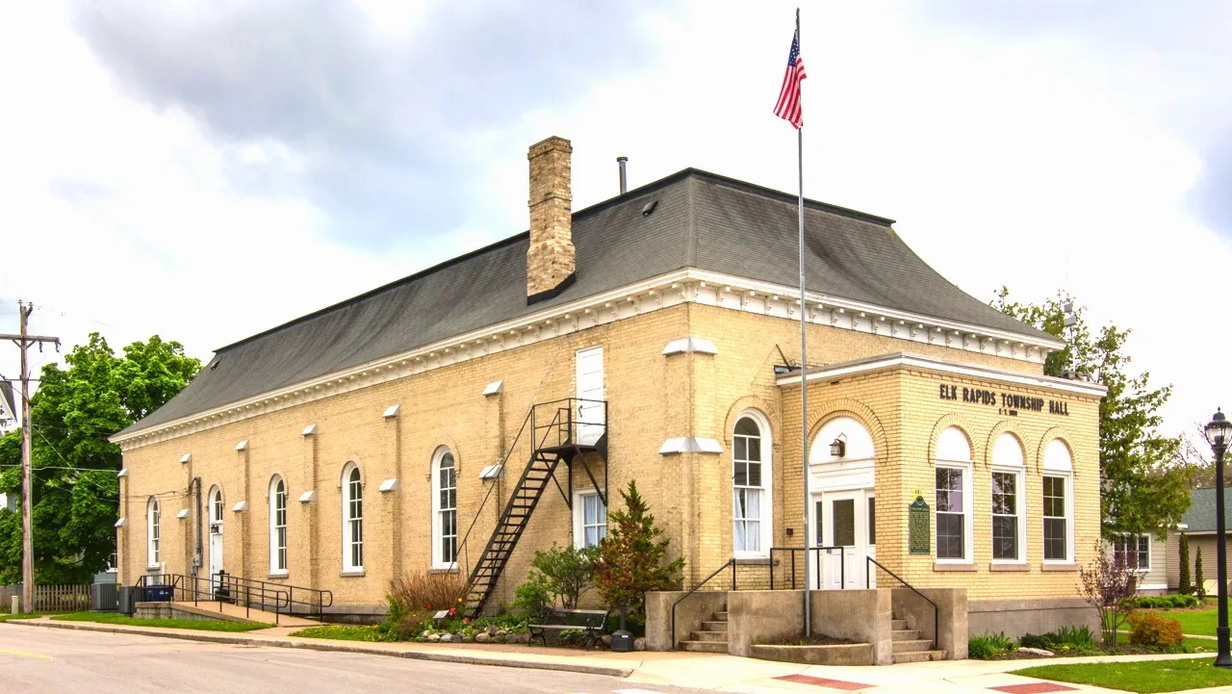
Everything You Need To Know About The Sale Of The Historic Elk Rapids Township Hall
By Craig Manning | Aug. 31, 2025
After months of debate, drama, and threatened litigation, the Elk Rapids Township Board voted on Monday sell the Historic Elk Rapids Township Hall to its longtime incumbents, the Historic Elk Rapids Township Hall Association (HERTHA), for $625,000. The township board had ignited controversy in recent months by considering a higher offer from a buyer who wished to turn the building into a residence. Monday’s vote marks the apparent end of the saga.
Built in 1883, the Elk Rapids Township Hall was designed to be both the hub of the local government and a social and cultural community center. Over the decades, it served as everything from a venue for Shakespearian theatre performances to a school auditorium and gymnasium. In 1973, the Michigan State Historic Preservation Office designated the township hall as a Michigan State Historic Site, and four years later, it was added to the National Register of Historic Places.
The township moved its offices out of the building in 2004, but the township hall has remained a community asset thanks to HERTHA, which formed in 2009 and has been leasing the space from the township since 2012. The building is the home venue of the Elk Rapids Players Theater Company, and also hosts a variety of other events – including, according to HERTHA, concerts, political rallies, meetings of local groups like the Elk Rapids Chamber of Commerce, seminars, birthday parties, weddings, memorial services, and more.
This past spring, the Elk Rapids Township board began discussing the prospect of selling the township hall. Trustees argued that the township could no longer shoulder the burden of insuring and maintaining the building, with Trustee Richard Hults reporting over $250,000 in immediate repair costs pending on the property. Additionally, Board Chair Dorance Amos suggested that the lease the township has with HERTHA “is probably, in most eyes, not legal,” given limitations on renting government buildings out for public uses like weddings or political events.
The board ultimately adopted a resolution in June, stating that the township hall was “not needed for any governmental public purpose and shall be sold for fair market value,” and hired Dan Stiebel of Coldwell Banker Commercial Schmidt Realtors to list the property.
Those decisions touched off a summer of debate in Elk Rapids regarding what constitutes the “highest and best use” of the historic building. At a July 14 meeting, Stiebel presented four offers he had received for the property. According to meeting documents, HERTHA originally offered to pay $525,000, “with a $10,000 increment escalation clause up to $604,000.” Notably, the township hall was appraised at $525,000, but listed at $700,000 due to its prime location right across the street from Veterans Memorial Park.
Of the three other offers on the table in July, two exceeded HERTHA’s: a $700,000 cash offer from an LLC called Deckrow Family Holdings, which expressed intentions “to rent back to HERTHA and keep building for public use”; and a $700,000 cash offer from Sam and Alivia Barnsley – plus a $5,000 increment escalation clause up to $730,000 – with plans “to use for residential purposes while continuing community events in the building.”
HERTHA and the Barnsleys were the last prospective buyers left standing by the time Monday’s meeting rolled around, with HERTHA’s bid increased to $625,000 and the Barnsleys’ to $730,000. Amos argued repeatedly throughout the meeting that the township should get “the highest and best” price for the property, and made a motion early on to accept the Barnsleys’ offer. That motion failed, with Amos and Hults voting yes and the other three trustees voting no.
Present in the audience, Alivia Barnsley criticized trustees for even considering HERTHA’s modified offer, given that it had been received late the previous evening – days after a township's deadline of noon on August 20. Barnsley suggested she and her husband would have made a move to “increase the difference” between the offers, had HERTHA’s bid come in on time.
“She has a point; she’s right,” Amos said, in response to Barnsley’s complaints. “So, entertain us: what would your offer be at this point, if we were to hear it?”
Rather than give a counter-offer on the spot, Barnsley requested that the board set a new due date for updated offers. Representatives from HERTHA, meanwhile, argued that the township had granted their organization “last look,” hence the late increase in their offer.
But HERTHA, like Barnsley, was critical of how Elk Rapids Township trustees had handled the entire situation, balking when asked by the board if the organization “could match the $730,000.” HERTHA board president Karen Morris criticized the township for moving the goalposts for her organization, noting that the board had previously indicated they’d be willing to accept a $625,000 offer from HERTHA.
“I guess if you told us today that if we had to go get $730,000, I’ve been told by somebody that they would give it to us,” Morris said. “But I don’t think that’s fair to your community, either.”
Morris also argued that the Barnsleys’ offer should have an asterisk next to it, given that the property is zoned P-1 (Public Lands) and would need to be rezoned to R-2 (Residential) for the couple to proceed with their intention of using the building as a home. “You don’t have [that $730,000 offer] as a P-1. You have that as an R-2,” Morris said, adding that the Barnsleys would have to “go through everything that needs to be done” to rezone the land. “We can take over the P-1,” she concluded.
The zoning question has become its own controversy in Elk Rapids this summer. In July, the township requested that the Village of Elk Rapids consider rezoning the township hall parcel to R-2, after the initial round of offers came through. At an August 19 public hearing, though, at the urging of the Elk Rapids Planning Commission, the Elk Rapids Village Council voted unanimously to deny that rezoning request, citing conflicts with the village master plan, the building’s long history as a public venue, and the community value of HERTHA as an organization. The denials have prompted the township to pursue litigation against the village.
Monday’s meeting ultimately concluded with the township board voting 3-2 to accept the offer from HERTHA, contingent upon the nonprofit having the funds in escrow by September 5, covering all closing costs, and taking the property as is. Hults and Amos dissented, with Hults arguing that there wasn’t enough evidence in HERTHA’s proposed business plan to indicate that the organization could afford to own the building.
“I would say we’ll be sitting here a year from today and [HERTHA’s mortgage lender] Alden Bank will own the building,” Hults said.
Comment






